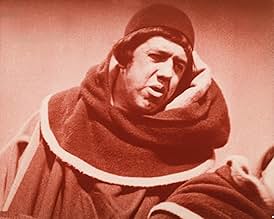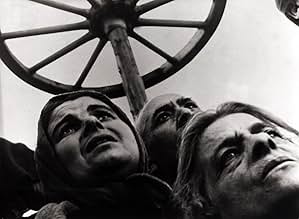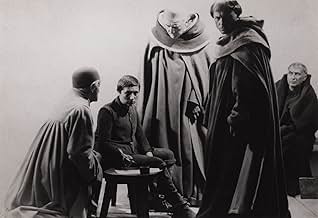1431 जीन डी''आर्क को विधर्म के आरोप में मुकदमे पर रखा गया था. सनकी न्यायविद जीन को पवित्र दर्शन के अपने दावों को दोहराने के लिए मजबूर करने का प्रयास करते हैं।1431 जीन डी''आर्क को विधर्म के आरोप में मुकदमे पर रखा गया था. सनकी न्यायविद जीन को पवित्र दर्शन के अपने दावों को दोहराने के लिए मजबूर करने का प्रयास करते हैं।1431 जीन डी''आर्क को विधर्म के आरोप में मुकदमे पर रखा गया था. सनकी न्यायविद जीन को पवित्र दर्शन के अपने दावों को दोहराने के लिए मजबूर करने का प्रयास करते हैं।
- निर्देशक
- लेखक
- स्टार
- पुरस्कार
- 4 जीत और कुल 1 नामांकन
Maria Falconetti
- Jeanne d'Arc
- (as Mlle Renée Falconetti)
Eugene Silvain
- Évêque Pierre Cauchon (Bishop Pierre Cauchon)
- (as Eugène Silvain)
Louis Ravet
- Jean Beaupère
- (as Ravet)
Armand Lurville
- Juge (Judge)
- (as André Lurville)
Jean Aymé
- Juge (Judge)
- (बिना क्रेडिट के)
Camille Bardou
- Richard Beauchamp, 13th Earl of Warwick
- (बिना क्रेडिट के)
Gilbert Dacheux
- Juge (Judge)
- (बिना क्रेडिट के)
Gilbert Dalleu
- Jean Lemaître
- (बिना क्रेडिट के)
Paul Delauzac
- Martin Ladvenu
- (बिना क्रेडिट के)
Dimitri Dimitriev
- Juge (Judge)
- (बिना क्रेडिट के)
सारांश
Reviewers say 'The Passion of Joan of Arc' is celebrated for its innovative close-ups, emotional intensity, and pioneering silent film techniques. Renée Falconetti's performance is lauded for its subtlety and expressiveness. The film delves into themes of faith, power, and human spirit, contrasting Joan's purity with her accusers' corruption. Critics praise Dreyer's meticulous direction and the film's historical significance. Some find the silent format and close-ups challenging, yet it remains a landmark in cinematic achievement.
फ़ीचर्ड समीक्षाएं
Carl Dreyer's "The Passion of Joan of Arc" is a film that feels light years ahead of its time. Lean and mean, focusing its entire narrative on the interrogation of Joan that inevitably lead to her execution by burning at the stake, the film is kinetic in ways that most films even now aren't. Composed almost completely of tight close ups, Dreyer and crew cut rapidly between disconcerting, asymmetrical shots, giving the film a breathless, anxious, nearly frenzied pace.
Maria Falconetti gives an almost unbelievably intense performance as the title heroine. Her performance, and the film in general, does get a bit monotonous -- it exists primarily of impassioned gazes into the middle distance, giant, tearing eyes opened wide, an expression of passionate, nearly demented religious fervor on her face. It's not a film that concerns itself with characters and plot, so we don't get to know Joan as a person. It's difficult to care for her particular plight and we instead feel compassion for her as one human being feeling compassion for another. For that reason, the film left me remembering its striking images and formal style more than any emotions I might have felt while watching it. But it's no less of a remarkable cinematic achievement for that.
Grade: A
Maria Falconetti gives an almost unbelievably intense performance as the title heroine. Her performance, and the film in general, does get a bit monotonous -- it exists primarily of impassioned gazes into the middle distance, giant, tearing eyes opened wide, an expression of passionate, nearly demented religious fervor on her face. It's not a film that concerns itself with characters and plot, so we don't get to know Joan as a person. It's difficult to care for her particular plight and we instead feel compassion for her as one human being feeling compassion for another. For that reason, the film left me remembering its striking images and formal style more than any emotions I might have felt while watching it. But it's no less of a remarkable cinematic achievement for that.
Grade: A
What can one say about this work of art that has not been said many times before by those far better qualified to explain both it's importance and place as cinema and art? I shall not comment on the greatness of the film's technical achievements; the stunning cinematography, the production design, the brilliance of the screenplay based on actual transcripts from the trial, or the perfection of Mr. Dreyer's direction. The performance of Falconetti as Jeanne d' Arc has a profundity and depth far beyond my ability to illuminate. I suppose the best I can hope to do is to share my feelings, however inadequately expressed, of the effect it had on me. To say that it may be the greatest film ever made is to sound both obvious and trite. That a work of such beauty and simplicity, made seventy-six years ago can still have the power to move audiences in an era of multi-million dollar, hi-tech, bombastic over-wrought cinematic drivel is in itself a testament to the vision and genius of Carl Theodor Dreyer, Maria Falconetti and their collaborators. It is nourishment for those that hunger for something more in cinema, a feast for the soul. It is a reminder that film can indeed be art, and this film like all great works of art, lifts and transports us from the routine of our work-a-day lives to enable us, if only for a moment to experience the sublime. When viewing it we look at it as looking in a mirror. That is to say we look into ourselves. We question ourselves as to our own beliefs, or the lack thereof and the strength of spirit that enables an individual to endure the unendurable. Viewing it is a profound experience the nature of which for myself is transcendent rather than religious, because I am not in the least a religious person. Transcendent because it evokes emotions and thoughts that I cannot wholly account for, or adequately explain.
"La Passion of Jeanne d'Arc" is stark, radiant, exalted, simple, (but never simplistic), and ultimately sublime. The rest is silence.
"La Passion of Jeanne d'Arc" is stark, radiant, exalted, simple, (but never simplistic), and ultimately sublime. The rest is silence.
10zeph-3
I saw this film for the very first time last week and was so tremendously captivated by it that I needed to share this rapture. The innovative camera-angles, the close-ups revealing pain and spirituality. It elevates the human condition and the Art of film. I would love to be able to go on into the whys or hows or technicalities. But my words couldn't do the film justice for the imagery still overwhelms me.
A certain amount of credit must surely be paid to the director for the genius of 'La Passion de Jeanne d'Arc.' The daring camera angles, use of incessant close-ups and peculiar authenticity all may be attributed to Carl Th. Dryer. However, Renee Maria Falconetti is the reason this film indeed surpasses all attempts at reaching the Platonic form of brilliance. Her performance is breathtaking by all accounts. One can not help but remain mesmerized by her expressions. Yes Dryer's gift to us of so many wonderful close shots of Falconetti should be acknowledged. He must be praised for his relentless filming of scenes to produce the desired result. Yet to imagine anyone else in this timeless role (such as Lillian Gish who was said to have been considered) is to envision a less than perfect film. Unimpeded by the silent medium in which she worked, Falconetti's mere tilt of the head or gentle glance pierce the soul of the viewer. We see her speak in Jeanne's native tongue. We see her compelling portrayal of the anguish which the saint most certainly endured. It is almost as if we are watching what the director said he had found; the martyr's reincarnation! This actress presents to us her raw beauty unmarred by powders or makeup - thanks to a decision of Dryer. How bitter-sweet the fact that we have this once thought to be lost silent film and yet can not help now but to long for more Falconetti. And so we return to 'La Passion de Jeanne d'Arc' and with each of many tears and inaudible sighs marvel at the staggering accomplishment which is Renee Maria Falconetti's Jeanne.
One of the last great silent films made during the advent of sound, Carl-Theodor Dreyer's The Passion of Joan of Arc is a haunting, riveting portrait of the historical martyr based on documentation from the original trial. Focusing primarily on the series of courtroom examinations that doomed the young warrior, the film gloriously employs vivid close-ups to accentuate the ordinariness (while at the same time exaggerating the most grotesque qualities) of Joan's inquisitors. Maria Falconetti is unforgettable as Joan, perfectly distilling the pain, terror, and saintliness required by what is probably one of the most demanding roles an actor could attempt. The consequence of Joan's conviction -- her burning at the stake -- allows Dreyer to hammer home his exquisite visual motif balancing erotic corporeality with transcendent spirituality.
क्या आपको पता है
- ट्रिवियाAfter completing the original cut of the film, director Carl Theodor Dreyer learned that the entire master print had been destroyed accidentally. With no ability to reshoot, Dreyer re-edited the entire film from footage he had originally rejected.
- गूफ़In the 15th century, a priest can be seen wearing a Jesuit robe. The Jesuit order was founded in the 16th century.
- भाव
Jeanne d'Arc: Dear God, I accept my death gladly but do not let me suffer too long. Will I be with You tonight in Paradise?
- इसके अलावा अन्य वर्जनIn the 1930s, a one-hour synchronized sound version was reissued under the name "The Immortal Saint" using David Ross as a narrator to replace intertitles.
- कनेक्शनEdited into From Camille to Joan of Arc (1961)
टॉप पसंद
रेटिंग देने के लिए साइन-इन करें और वैयक्तिकृत सुझावों के लिए वॉचलिस्ट करें
- How long is The Passion of Joan of Arc?Alexa द्वारा संचालित
विवरण
- रिलीज़ की तारीख़
- कंट्री ऑफ़ ओरिजिन
- भाषाएं
- इस रूप में भी जाना जाता है
- La pasión de Juana de Arco
- फ़िल्माने की जगहें
- उत्पादन कंपनी
- IMDbPro पर और कंपनी क्रेडिट देखें
बॉक्स ऑफ़िस
- US और कनाडा में सकल
- $21,877
- US और कनाडा में पहले सप्ताह में कुल कमाई
- $6,408
- 26 नव॰ 2017
- दुनिया भर में सकल
- $22,731
- चलने की अवधि
- 1 घं 50 मि(110 min)
- रंग
- ध्वनि मिश्रण
- पक्ष अनुपात
- 1.33 : 1
इस पेज में योगदान दें
किसी बदलाव का सुझाव दें या अनुपलब्ध कॉन्टेंट जोड़ें


















